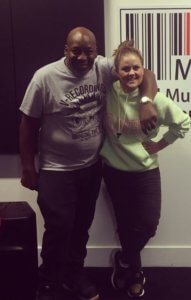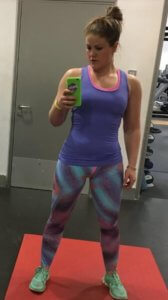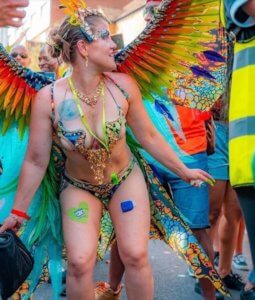 Tell us a bit about who you are what you have been doing for Diabetes awareness?
Tell us a bit about who you are what you have been doing for Diabetes awareness?
My name is Kate and I am a disability and social justice advocate and a public health expert based in London. My current job covers quality assurance, long-term conditions and primary care services and I’ve worked in 16 London boroughs in Council, NHS and voluntary sector roles, as well as supporting former street children in Zimbabwe and working with the UN in HIV prevention and food security in Uganda. I have a masters in community health psychology from the LSE and a passion and interest in sexual health, young people and women’s rights. I am a trustee for the London-based domestic violence and criminal justice charity Advance and was previously a trustee for the Young Women’s Hub in Lewisham.
I had my 40th birthday this summer and wanted to do something interesting and different after all of the excitement of a big party. I was inspired by MOBO Award winning Garage artist, Gemma Fox who involved me in her radio show tour a few months ago, where I helped promote her organisation Save Our Boys and Girls, which gives young people positive opportunities through creative arts to reduce knife crime. I thought it was a great strategy to get the word out to a varied audience.
So, I decided to do a radio show tour of my own, to raise awareness about both main types of diabetes, Type 1 and Type 2, for diabetes awareness month in November. I contacted a couple of friends and through my networks, I was interviewed on 5 radio shows: OnTop Radio with LukanOnline, Mi-Soul Radio with Jumpin Jack Frost, Kane Fm’s culture and community show with Jenniann, EachTeach Radio with Colin McDonald aka bboy Tuway and Maritime Radio with Tam. I’ve got 2 more lined up: Message in the Music show with Culture Mark on Colourful Radio and The Reaching Out Show on Soho radio with PoetCurious and Ty. And I’m hoping to get booked by a BBC Radio Show soon! Melody Kane’s show would be ace as she’s so into fitness too!
Type 1 affects around 400,000 people in the UK including me and type 2 affects around 4million people and is the one that is mostly referred to when the word ‘diabetes’ is used in the media and type 1 used to be thought to only affect children and type 2 only overweight adults and that everyone with a form of diabetes will have their leg cut off, which has shifted a lot in recent years, particularly with the advent of technological advancements in medicine such as insulin pumps where outcomes are often better now than before, so misconceptions are often rife. One of my fantastic staff leads on type 2 diabetes prevention and we also do a lot of work on long-term conditions, so that coupled with my own experience, means I know quite a bit about from a range of perspectives, from implementing policy to being a patient. I thought it was a great idea and that it could help to put a spotlight on all of this, by approaching things in a more dynamic and open way, with some myth busting, inspiring people to adopt a healthier lifestyle and tips about how to cope.
You have had type 1 diabetes for 21 Years, what is the biggest affect this has had on your life?
Having Type 1 diabetes has made me a better person. It has made me stronger and more empathetic and has heightened my critical thinking. It has raised my awareness of others’ needs and heightened my natural advocacy skills. Anyone who has done the Mayers-Briggs test will be familiar with the Campaigner personality type; that is me to a T. And in the last 21 years, managing type 1 diabetes and all of the curveballs it has thrown at me, has helped me become an effective leader, mentor and supporter at work and in my social circle. Over the years, I’ve helped heaps of friends and relative strangers with bullying at work, pregnancy loss, critical illnesses, bereavement, mental health, business development and relationship breakdowns. I’ve also mentored over 100 people, including some I’ve only met through Linked-In, proofreading Masters dissertations, university and job applications, CV writing and interview prep.
It has even somehow made me a little bit more patient and slightly less fussy!
In recent years many nutritionists have suggested diabetes could be reversed through diets (Keto, low carbs etc), what are your thoughts on this and how has diet helped you manage your symptoms?

There is some emerging evidence to suggest that type 2 diabetes can be reversed, through weight management programmes involving a low carb diet. I have been following the initial results of the Direct study and it seems promising, with more than a third in remission after 2 years. I think this sounds great. As a public health professional though, I think we do need to see more evidence for us to better understand how these impacts across a broader population and how this may be sustained over time as 2 years is reflectively short in the course of someone’s life.
My healthy eating advice is quite straight forward — balance and non-restrictive. Be as healthy as you can, don’t feel guilty if you don’t stick to your plan and have cake on your birthday if you want it. More vegetables and less refined white starches (e.g white sugar, white flour etc) are always good for improving health as the former are nutrient dense vs the latter which barely have any nutritional value. Consuming low-fat high protein sources like beans, fish, lean meat and tofu are great for muscles and reducing cravings as they make us feel full. This is important for everyone whether you have a long-term condition or not. A healthier diet can also help prevent type 2 diabetes and dementia as well as a whole host of other issues.
For me, as someone with gastroparesis — slow gastric transit where food takes longer to digest and there’s often a bulge under the rib cage after eating — which is a complication from type 1, I gave up meat, eggs, dairy and fish and went plant-based 2 years ago to try and support my system. Red meat is particularly difficult to digest and my pain has reduced drastically since I made the change as I’d previously been in A&E in agony on a number of occasions. I’m not a strict vegan and I’ve had a few lapses, but I have definitely felt so much better. I’ve adapted old recipes with various types of beans and made my own hummus and snacking on cashews is pretty damn good! I’ve been asked about whether I miss my former favourite meals like baked salmon, oxtail and bacon with avocado, of course there is a part of me that does, a pain free meal for me is way more delicious though!!!!
I try to eat as low carb as possible as often as possible and this is mostly due to reduced margin of error when dosing insulin for carbs. Just a tiny amount too much insulin can cause a hypo (low blood sugar), which feels like hell and just a tiny amount too little can create a colossal rise in blood sugar which on a stressful day can make me worry about organ damage and can be really frustrating as it sometimes takes hours to come down again.
As Type 1 diabetes is an autoimmune condition, it cannot be reversed. There are some people who staunchly believe that people with type 1 do not need to take insulin artificially. There are a number of dangerous claims about certain foods and herbs being able to cure us — including spinach, which I eat every day. This has resulted in a number of deaths in recent years, including of children! Without insulin, the human body has around 2 weeks before it goes into a diabetes induced coma. Anyone who has type 1 diabetes is strongly advised to continue to take their insulin, as instructed by their endocrinologist.
For anyone who has a history of diabetes, or may be borderline, what advice could you give them on how to control or prevent it?
Support from your GP is crucial for people who have any risk factors for type 2 diabetes and anyone who has been diagnosed with pre diabetes. You can find out more with the Diabetes UK Know Your Risk Tool found online.
There is a National Diabetes Prevention Programme, weight management programmes and exercise on referral options — your GP can give you more information, although the type of service and access to these may be based on set criteria depending on where you live.
Type 1 diabetes is harder to predict. For anyone newly diagnosed I would advise joining a support group and making friends with people who can support you. There is heaps of information online about type 1, type 2 and other types of diabetes in places like Diabetes UK, as well as on Facebook and Instagram. Type 1 specific information and support is found from JDRF, T1 International and BeyondType1.
Tell us about what you do when you are not campaigning?

In my spare time, I attend Hip-Hop and spoken word events, play mas at Notting Hill carnival, lift weights, cook and eat delicious food and dance and laugh as much as possible.
How can we find out more about your activities?
Instagram — @thediabeteswarrior
During my interview on Maritime Radio in Greenwich, Tam introduces me as ’the diabetes warrior’ so I immediately set up a new instagram account to publicise the Radio tour and continue my approach of raising awareness of both Type 1 and Type 2, as I don’t think anyone else is doing it quite like I am!
Final words?
See the opportunities in everything, be as healthy as you can, ask for help, enjoy life as much as possible, learn something new, share, never give up, and love your body!
Rishma
Latest posts by Rishma (see all)
- INTERVIEW | TRELL SAVONE: FROM BUNKIE TO THE WORLD WITH “SHINE” — June 30, 2025
- NEW MUSIC | MCSOLOMON AND DERAJAH ‘KINGSTON TO LONDON’ — June 30, 2025
- REDMAN RETURNS TO THE UK THIS SUMMER FOR HIS LONG AWAITED TOUR — June 26, 2025
